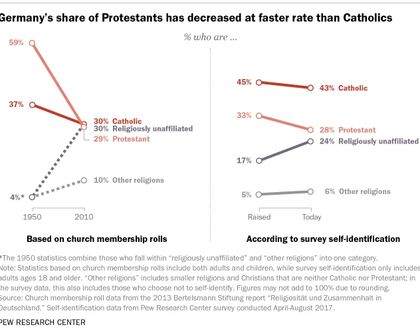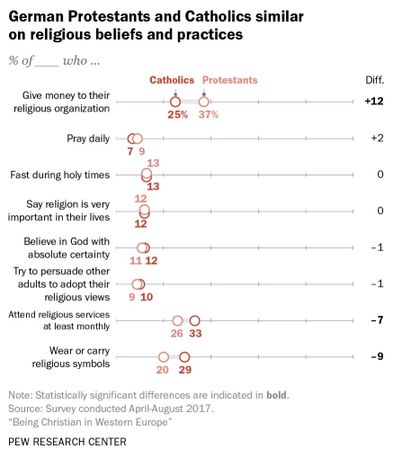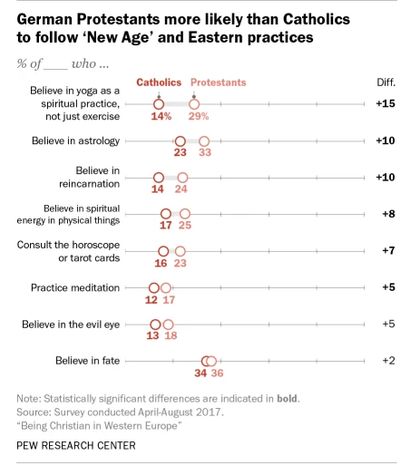For the first time in the history of the country where the Reformation began, there are more Catholics than Protestants.
 Cologne Catholic cathedral. / Pixabay (CC0)
Cologne Catholic cathedral. / Pixabay (CC0)
Although Germany is the birthplace of Martin Luther and the Protestant Reformation, since the middle of the 20th century, the country has seen a dramatic shift away from Protestantism.
The decline has been bigger that the one that has taken place among Catholics. Over the next 60 years, the share of ‘self-identified’ Protestants fell 30 percentage points, while the share of Catholics dropped 7 points, a new Pew Research survey shows.
Meanwhile, there has been a rising share of the religiously unaffiliated, who accounted for 30% of Germans in 2010, up from fewer than 4% in 1950. A recent Pew research also showed that the share of Muslims in Germany has been growing, due in large part to immigration.
 German Catholic s and ‘self-identified’ Protestants. / Pew Research.
German Catholic s and ‘self-identified’ Protestants. / Pew Research.
EAST AND WEST GERMANY
According to a research made by the scholars of religion and sociology at the University of Münster in Germany Detlef Pollack and Olaf Müller, in 2013, “the nationwide decline in German Protestants is also apparent when looking separately at East and West Germany (which reunified in 1990)”.
East Germany was predominantly Protestant when the country was formed in 1949, and its decline “is widely considered to be the result of persecution, repression and marginalization of religion during the roughly four decades of communist rule”.
The reasons of the steeper declines among Protestants in Western Germany, include “a strong Catholic identity forged from years of existence as a minority religion, and doctrinal differences over salvation that make formal church involvement more necessary for Catholics than for Protestants”.
RAISED PROTESTANT, CURRENTLY PROTESTANT?
A recent Pew Research Center analysis also confirms a drop in the share of ‘self-identified’ Protestants in Germany.
There has been a decline among adults asked about their current religious denomination and the denomination in which they were raised: of 33% raised Protestant, 28% are currently Protestant.
At the same time, the share of those who say they are Catholic has remained stable: 45% were raised Catholic and 43% currently identify as Catholic.
 German Catholic s and ‘self-identified’ Protestants religious beliefs. / Pew Research.
German Catholic s and ‘self-identified’ Protestants religious beliefs. / Pew Research.
PROTESTANTS, MORE LIKELY TO FOLLOW NEW AGE PRACTICES
According to Pew Research Center data, Protestants and Catholics in Germany follow “traditional Christian religious beliefs and behaviours” at very similar low rates: both say they hardly pray daily (7% of catholic, 9% of Protestants) or believe in God with absolute certainty (11% and 12%).
Additionally, German ‘self-identified’ Protestants are more likely than their Catholic counterparts to follow Eastern or New Age practices and beliefs.
More tan 30% of German Protestants believe in astrology, while only 23% of Catholics do. About one-quarter of Protestants consult the horoscope, tarot cards or fortune tellers (23%), compared with 16% of Catholics.
The survey does not say how many of those German Protestants are evangelicals and what they specifically believe.
 German Catholic s and ‘self-identified’ Protestants New Age practices. / Pew Research.
German Catholic s and ‘self-identified’ Protestants New Age practices. / Pew Research.
NATIONALISM AND MIGRATION
Pew Research Center has recently conducted a survey in 15 Western European countries, examining “attitudes on nationalism, immigration and religious minorities through the lens of religious affiliation and commitment”.
The survey found that in Germany Catholics are more likely than Protestants to profess nationalistic attitudes and to express anti-immigrant and anti-religious minority attitudes.

Las opiniones vertidas por nuestros colaboradores se realizan a nivel personal, pudiendo coincidir o no con la postura de la dirección de Protestante Digital.
Si quieres comentar o